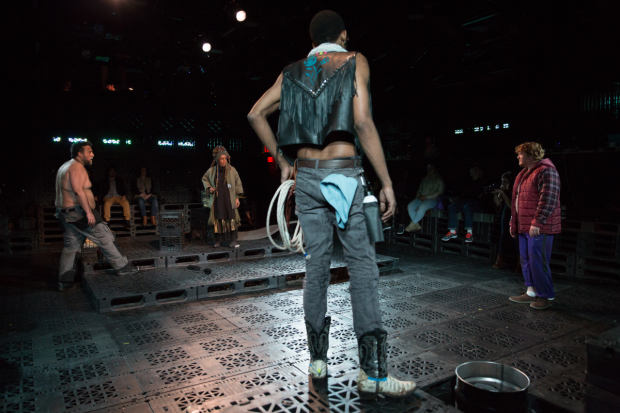Samara

"Experimental" is the word most commonly attached to playwright Richard Maxwell, whose inscrutable new play with Soho Rep, Samara, fits cozily under that expansive umbrella. With stacks of plastic crates (Louisa Thompson's work as set designer functions as both set and seating in the mezzanine space of the A.R.T./New York Theatres), Maxwell and director Sarah Benson draw the outline of a vast indigenous world where darkness overwhelms and natural law governs. It's a compelling space with infinite possibilities, making it all the more disappointing when the characters tasked with filling it fail to realize its potential.
The time period is never specified, but considering the stilted dialogue and frequent use of the word "sirrah" (an archaic way to address a young man), the implication is a world several centuries past. A boy Messenger (Jasper Newell with the dichotomous innocence of youth and cruelty of experience) goes to collect his wages from his Supervisor (Roy Faudree), who gives him the option to take either a meager seven dollars or go on a lengthy and dangerous journey to collect a long-standing debt. After killing the Supervisor, the Messenger makes the journey, only to find that the debtor is deceased, leaving him to contend with innkeepers the Manan (Becca Blackwell) and the Drunk (Paul Lazar), who are now responsible for repaying this tired wanderer. Suddenly, the Manan (a Gaelic word meaning "a new beginning") becomes our main character, and the Messenger's journey comes to an end. Enter Agnes, a wise old woman (played with maternal centeredness by Vinie Burrows) and her two sons, labeled Cowboy (Modesto Flako Jiménez) and Beast (a brute Matthew Korahais), who are dressed to match their titles by costume designer Junghyun Georgia Lee. Together, they exude the alternately violent and communal nature of ancient family tribes, whose collective existence keeps them alive.
Every new development feels like the next step in a fever dream (aided by the menacing light and sound design by Matt Frey and Palmer Hefferan). No one quite has an identity, nothing exactly makes sense, and we consistently feel nowhere in both space and time. It's all very much in keeping with Maxwell's aversion to linear storytelling, but it doesn't change the fact that with no clear through-line nor tonal consistency among any of the performances, the experience of Samara is one of being upstream without a paddle.
The play's one anchor is its poetic stage directions, read aloud by singer-songwriter Steve Earle, who also lends the show its original music (beautifully ethereal tones executed by Ivan Goff on Uilleann pipes and Anna Wray on percussion). His narrations move from brief scene-setting sentences to page-long parables that exist separate from the story. The language is beautiful and dense, and Earle's gravelly voice is a pleasant instrument for it. But the potentially helpful ideas behind these framing stories are lost in Earle's rote delivery. Until a memorized passage at the end, he reads his lines from behind a music stand, speaking the words but communicating none of the content. If the action in the middle of the floor is unapologetically free-flowing and unhindered, we need Earle to be the levee, containing it and giving it a semblance of shape. Without it, Samara leaves us to drown.











